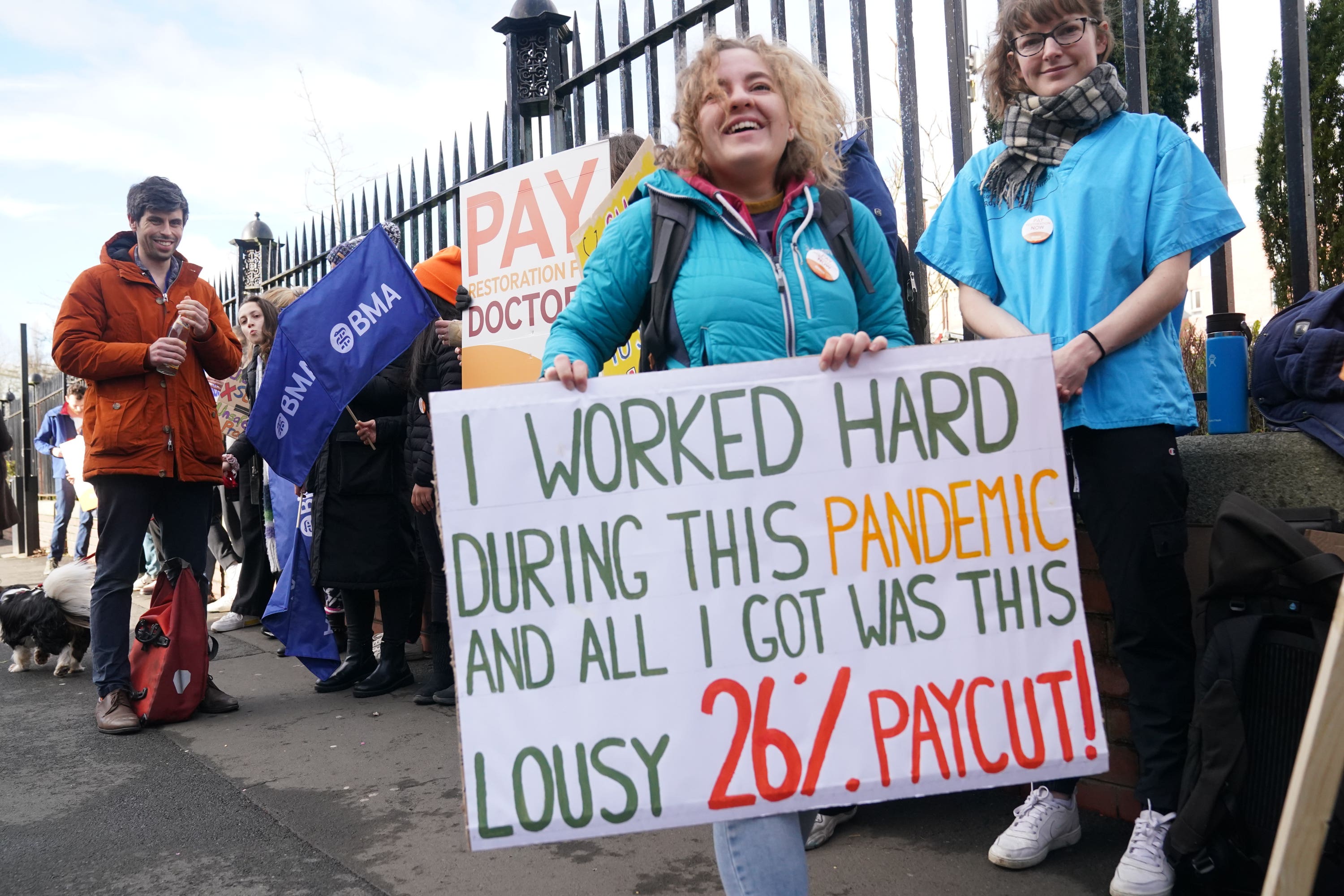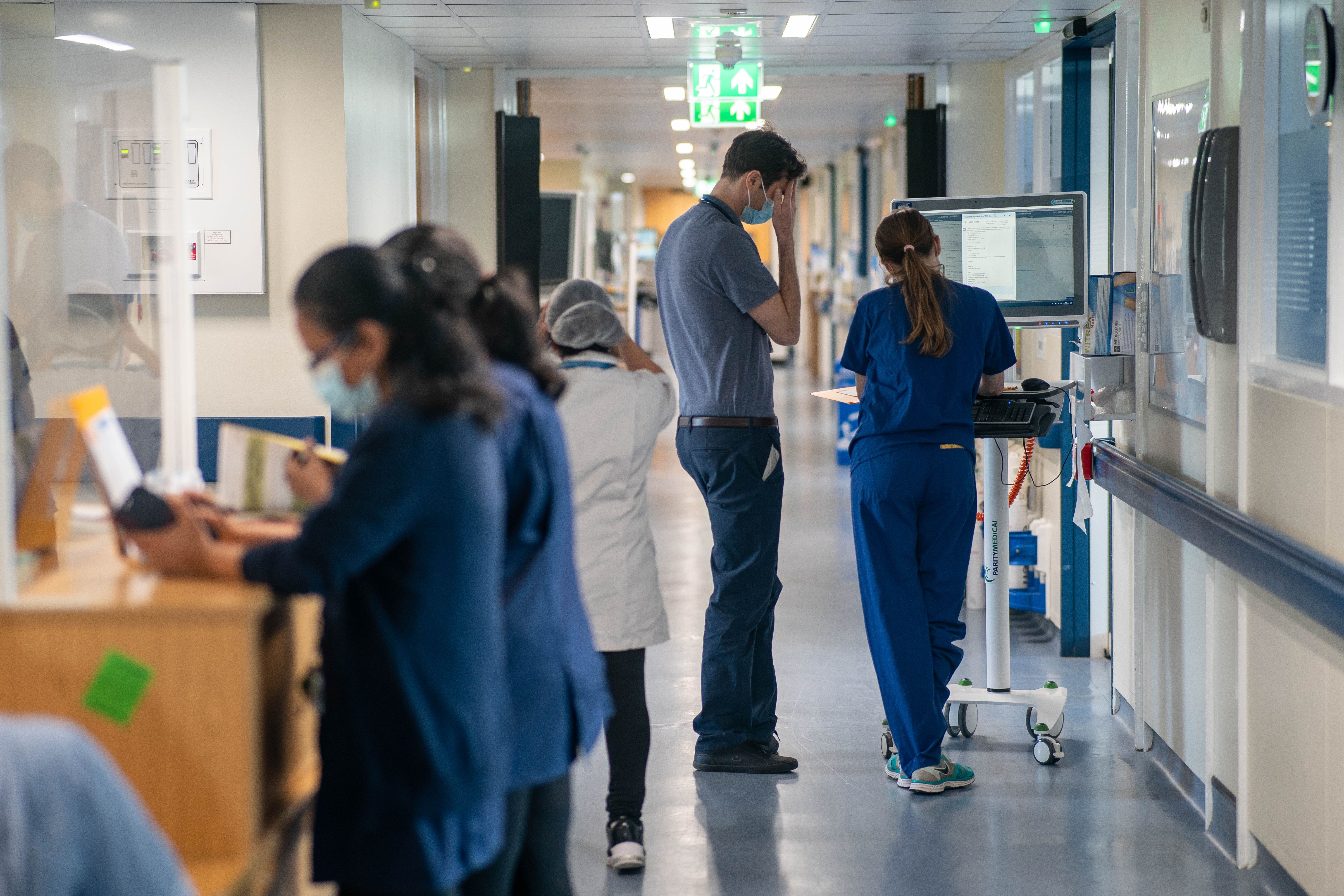NHS strikes: What is a junior doctor’s salary and what is the government offering?
The British Medical Association is calling for junior doctors’ real-terms pay to be restored to 2009 levels
Your support helps us to tell the story
From reproductive rights to climate change to Big Tech, The Independent is on the ground when the story is developing. Whether it's investigating the financials of Elon Musk's pro-Trump PAC or producing our latest documentary, 'The A Word', which shines a light on the American women fighting for reproductive rights, we know how important it is to parse out the facts from the messaging.
At such a critical moment in US history, we need reporters on the ground. Your donation allows us to keep sending journalists to speak to both sides of the story.
The Independent is trusted by Americans across the entire political spectrum. And unlike many other quality news outlets, we choose not to lock Americans out of our reporting and analysis with paywalls. We believe quality journalism should be available to everyone, paid for by those who can afford it.
Your support makes all the difference.Junior doctors have begun their four-day strike, which is expected to heap “incredible pressure” on the NHS and create “unparallelled” disruption.
The public has been urged to avoid “risky” behaviour and stay away from A&E if possible during this week’s industrial action, while hospital bosses warned of a “catastrophic” impact on waiting lists as it was estimated that 350,000 routine operations were likely to be cancelled.
Health secretary Steve Barclay has described the strikes as “very disappointing”, and according to Dr Vivek Trivedi of the British Medical Association (BMA), the government had not yet “given any counter-offer at all” when the industrial action began on Tuesday.
The strikes were backed by 98 per cent of the 36,000 BMA members who took part in February’s ballot.
What are junior doctors demanding?
The BMA is demanding that ministers reverse the real-terms pay cut which junior doctors have seen since 2009 as a result of below-inflation pay rises – which the union estimates amounts to 26 per cent.
With inflation currently running at its highest level in years, the BMA has estimated that ministers need to award doctors a 35 per cent pay increase in 2022-23 to bring salaries back in line with 2009 levels.
Despite junior doctors having received a 16.9 per cent pay rise since 2009, prices have risen by considerably more over the same period.

By how much is a matter of contention, however. The BMA refers to the retail price index (RPI), which suggests that prices rose 58 per cent over that period – an older measure of inflation which tends to be heavily influenced by Britain’s extortionate house prices.
Meanwhile, the more commonly used consumer price index (CPI) suggests that prices increased by 40 per cent over that time, which according to The Times would mean that junior doctors’ pay fell in real-terms by 16 per cent.
What are junior doctors paid?
Under the 2016 contract, junior doctors’ basic pay ranges from £29,384 to £58,398 depending on their seniority.
While the BMA has said that the roughly 10 per cent of junior doctors in their first year post-university receive basic pay of £14.09 an hour, the average junior doctor gets around 30 per cent more in additional payments, such as for holidays and working unsociable hours, according to the BBC.
It can take up to a decade for junior doctors to reach the highest of the five core pay points, which amounts to £28 an hour in basic pay, but can end up at closer to £77,000 per year once extra payments are added.

The latest average pay data from NHS England covering the year to September suggests junior doctors are paid between roughly £20 to £30 per hour, Full Fact reports.
In a BMA survey conducted earlier this year, which received 3,000 responses, 60 per cent of junior doctors reported low morale and 51 per cent described their desire to continue working in the NHS as low.
Office for National Statistics figures on average earnings since 2010 suggest that junior doctors have fared worse than most professions aside from teachers and social workers.
What has the government offered?
The government has so far refused to negotiate with junior doctors over pay, arguing that the BMA agreed to a multi-year pay deal following the last round of strikes in 2016.
The health secretary has described the BMA’s demand for a 35 per cent pay rise as “unrealistic”, while the union has in turn accused the government of refusing to use the offer as a starting point in negotations.
Calling Mr Barclay’s position “unreasonable” and “untenable”, Mr Trivedi, co-chair of the BMA’s junior doctors committee, said: “We’ve made it clear, we’re willing to negotiate, we need to have an open dialogue, which the government is refusing to do.”
A “credible” offer from ministers would lead to doctors’ calling off the strike action for the rest of the week, he added.
Mr Barclay said last month that the government had “offered the same terms to the junior doctors that were accepted by the other trade unions”, which includes a 5 per cent pay rise from April and one-off bonus.





Join our commenting forum
Join thought-provoking conversations, follow other Independent readers and see their replies
Comments